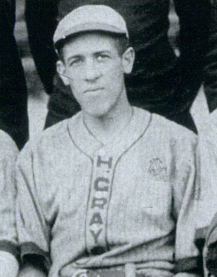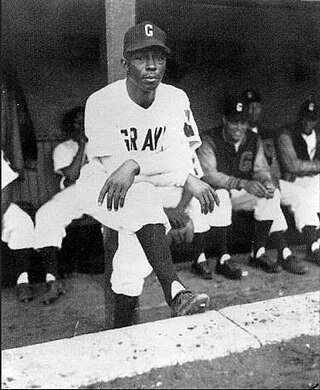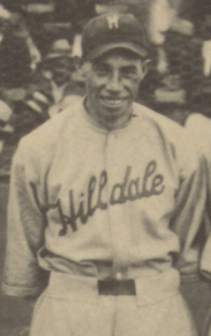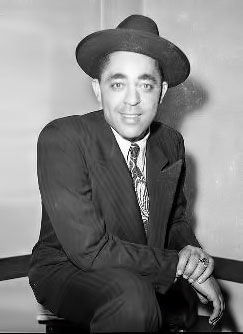
Oscar McKinley Charleston was an American center fielder and manager in Negro league baseball. Over his 43-year baseball career, Charleston played or managed with more than a dozen teams, including the Homestead Grays and the Pittsburgh Crawfords, Negro league baseball's leading teams in the 1930s. He also played nine winter seasons in Cuba and in numerous exhibition games against white major leaguers. He was inducted into the National Baseball Hall of Fame in 1976.

Joshua Gibson was an American baseball catcher primarily in the Negro leagues. Baseball historians consider Gibson among the best power hitters and catchers in baseball history. In 1972, he became the second Negro league player to be inducted in the National Baseball Hall of Fame.
The Homestead Grays were a professional baseball team that played in the Negro leagues in the United States.

William Julius "Judy" Johnson was an American professional third baseman and manager whose career in Negro league baseball spanned 17 seasons, from 1921 to 1937. Slight of build, Johnson never developed as a power threat but achieved his greatest success as a contact hitter and an intuitive defenseman. Johnson is regarded as one of the greatest third basemen of the Negro leagues. In 1975, he was elected into the Baseball Hall of Fame after being nominated by the Negro Leagues Committee.

The East–West All-Star Game was an annual all-star game for Negro league baseball players. The game was the brainchild of Gus Greenlee, owner of the Pittsburgh Crawfords. In 1933 he decided to emulate the Major League Baseball All-Star Game, using Negro league players. Newspaper balloting was set up to allow the fans to choose the starting lineups for that first game, a tradition that continued through the series' end in 1962. Unlike the white All-Star game which is played near the middle of the season, the Negro All-Star game was held toward the end of the season.

Cumberland Willis "Cum" Posey Jr. was an American baseball player, manager, and team owner in the Negro leagues, as well as a professional basketball player and team owner.
Charles "Teenie" Harris was an American photographer from Pittsburgh, Pennsylvania. Harris was known for his photographs of residents and prominent visitors to Pittsburgh, including musicians and baseball players, which often appeared in the Pittsburgh Courier. His work is preserved in the permanent collection of the Carnegie Museum as a chronicle of mid-20th century life in Pittsburgh's African American communities.
Josh Gibson Field is a baseball venue located in the Hill District of Pittsburgh, Pennsylvania. The field was known as Ammon Field or sometimes Ammons Field until 2008, when it was renamed for Baseball Hall of Fame player Josh Gibson.

Elander Victor Harris was an American professional baseball outfielder and manager in the Negro leagues. Listed at 5 ft 10 in (1.78 m), 168 lb., Harris batted left-handed and threw right-handed.
Joshua Gibson Jr. was an African-American baseball infielder in the Negro leagues. He played for the Homestead Grays in 1949, 1950 and 1952. He also played with the Farnham Pirates in the Provincial League in 1951. His father, Hall of Famer Josh Gibson Sr., played in the Negro leagues, and is considered one of the greatest power hitters in baseball history.

Merven John "Red" Ryan, born Mervin Ferguson, was an American baseball pitcher in the Negro leagues. He played from 1915 to 1932 with several teams, playing mostly with the Hilldale Club.

Theodore Roosevelt Page, nicknamed "Terrible Ted", was an American baseball player. From 1923 to 1937, Page played for numerous Negro league teams, including the Homestead Grays and Pittsburgh Crawfords. On a 1986 Larry Fritsch baseball card, “…Page is regarded as one of the best outfielders ever to play the game.” He is a member of the Pennsylvania Sports Hall of Fame.

Sellers McKee Hall was the first African-American music promoter to be based in Pittsburgh, Pennsylvania, as well as professional player and executive in Negro league baseball.

John Wendell Smith was an American sportswriter and civil rights activist who was influential in the choice of Jackie Robinson's career as the first African American Major League Baseball player. Similarly, Smith was one of the first African American sport-writers to be a member of the Baseball Writers' Association of America, and was posthumously awarded the J. G. Taylor Spink Award by the Baseball Hall of Fame in 1993.

William Pennington Young, nicknamed "Pep" or "Pimp", was an American Negro league catcher who played for the Homestead Grays in the 1920s.
The 1932 Detroit Wolves baseball team was a Negro league baseball team that competed in the East–West League (EWL) during the 1932 baseball season. The team compiled a 28–9 record and won the EWL pennant, finishing six-and-a-half games ahead of the second-place team. The Wolves played their home games at Hamtramck Stadium in Hamtramck, Michigan.

Edward Rile, nicknamed "Huck", was an American Negro league pitcher and first baseman who played for several teams from 1918 to 1936.

Raymond Harold Harris, nicknamed "Mo", was an American Negro league second baseman between 1918 and 1931.
James R. "Pete" Willett was an American athlete who played baseball as an infielder in the Negro leagues and basketball. He played baseball with several teams from 1923 to 1928.
Harry G. "Wu Fang" Ward was an American college and professional athlete in the 1920s and 1930s.













